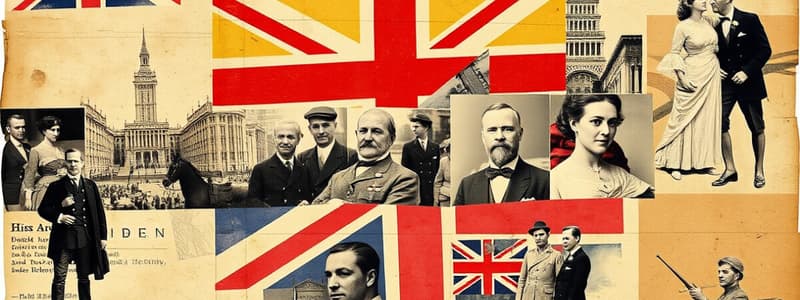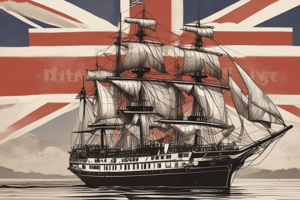Podcast
Questions and Answers
What major financial change occurred in Great Britain by the end of the Great War for Empire?
What major financial change occurred in Great Britain by the end of the Great War for Empire?
- Taxes were entirely abolished.
- Excise taxes were eliminated.
- Interest on the national debt consumed 60% of the budget. (correct)
- The national debt decreased significantly.
What was one of the perceived attitudes of American colonists towards their rights compared to the British?
What was one of the perceived attitudes of American colonists towards their rights compared to the British?
- They thought they were entitled to political independence.
- They saw themselves as British subjects entitled to greater liberty. (correct)
- They felt they had no rights at all.
- They believed they were entitled to less liberty than the British.
Which group was seen as problematic by British officials after the Great War for Empire?
Which group was seen as problematic by British officials after the Great War for Empire?
- Many diverse groups including French, Dutch, and Africans. (correct)
- Only the Native Americans.
- Only the British subjects in the Americas.
- Primarily the wealthy colonists.
What type of taxes did British ministries increasingly rely upon during the eighteenth century?
What type of taxes did British ministries increasingly rely upon during the eighteenth century?
What was Lord Halifax’s view of the American colonists?
What was Lord Halifax’s view of the American colonists?
What notable statement did Henry Ellis make regarding American colonists?
What notable statement did Henry Ellis make regarding American colonists?
What was a significant cost incurred by Great Britain due to the war?
What was a significant cost incurred by Great Britain due to the war?
Which of the following was not a reason for British administrators' concerns about their American colonists?
Which of the following was not a reason for British administrators' concerns about their American colonists?
What was the per capita tax burden in the 1760s?
What was the per capita tax burden in the 1760s?
Which two British opposition parties criticized the government's tax policies?
Which two British opposition parties criticized the government's tax policies?
What action did British Parliament take to collect trade duties from colonial merchants?
What action did British Parliament take to collect trade duties from colonial merchants?
What was one consequence of the military victory for Britain in the conflict?
What was one consequence of the military victory for Britain in the conflict?
What did John Wilkes criticize in British politics?
What did John Wilkes criticize in British politics?
How did British officials perceive the power dynamics in Massachusetts?
How did British officials perceive the power dynamics in Massachusetts?
What was a consequence faced by convicted smugglers in Britain during this period?
What was a consequence faced by convicted smugglers in Britain during this period?
What did the British government do to counter colonial merchants evading trade duties?
What did the British government do to counter colonial merchants evading trade duties?
Flashcards are hidden until you start studying
Study Notes
Transformation of the British Empire
- The Great War for Empire (1756–1763) significantly altered the governance of British colonies in North America.
- Post-war, British administration had to manage complex and costly responsibilities far beyond previous levels of oversight.
- American colonists felt a growing entitlement to liberties exceeding those of English citizens, as expressed by Henry Ellis, former governor of Georgia.
Colonial Identity and Conflict
- Colonists, including diverse migrant groups, were perceived by British officials as "foreigners," deepening tensions over identity.
- Wealthy Philadelphia lawyer John Dickinson asserted that colonists were British subjects deserving liberty, setting the stage for identity conflicts between Britain's rulers and American colonists.
Economic Impact of War
- The national debt skyrocketed from £75 million to £133 million due to war expenses, alarming many British citizens.
- By war's conclusion, 60% of Britain's budget was consumed by interest on this debt, prompting increased taxation.
- Taxation shifted from landowners to consumables, affecting the middling and poorer classes.
- Excise taxes were levied on everyday goods, including salt and beer, with a notable stamp tax on paper products.
Government Response to Economic Strain
- To fund the war effort, Britain expanded its tax bureaucracy, increasing the number of customs agents and enforcing strict measures against smuggling.
- Convicted smugglers faced severe penalties, including death or forced transportation to America, highlighting the harsh measures taken during this period.
- About 50,000 English criminals were sent to America as indentured servants, driven by the need for labor.
Political Consequences and Reform
- Political opposition arose from the Radical Whigs and Country Party, who criticized the influence of financial interests and demanded broader representation.
- John Wilkes campaigned against voting irregularities in aristocratic territories, advocating for urban representation.
Power Dynamics in Colonial Governance
- The war revealed the limited power of British royal governors in America, who were thwarted by opposition from colonial assemblies.
- British officials noted the significant influence of the General Court in Massachusetts, complicating the enforcement of British laws.
- The Revenue Act of 1762 aimed to tighten control over colonial trade by addressing tax evasion and ensuring stricter compliance.
Post-War Military Policy
- Following military victories, Britain established a peacetime deployment of 15 royal battalions (approximately 7,500 troops) in North America to maintain order and support its new policies.
Studying That Suits You
Use AI to generate personalized quizzes and flashcards to suit your learning preferences.




